

Wisconsin Banker

Strategic Budgeting for 2025: Key Considerations By Katie Resier
As banks across Wisconsin begin their budgeting process for 2025, it is a tumultuous time with uncertainty on many fronts. WBA interviewed 3 experts whose insights can guide bank leadership as they plan for the year ahead.
Augustine Faucher, Ph.D. is senior vice president and chief economist at PNC Financial Service Group. Faucher addressed WBA members during the 2023 Midwest Economic Forecast Forum. Look for the new PNC Fall Economic Outlook Survey, which will be available soon.
Prepare for Slower Growth
Faucher cautioned that banks should expect slower growth in consumer spending and business investment growth, but still expects economic expansion, sharing, “I think we'll see
Seamless Beginnings: How Banks Are Shaping the Onboarding Journey By Katie Resier
New hires too often describe their first days on the job as being stressful and headache-inducing. It’s not unusual to hear the expression “It’s like trying to sip from a firehose.” A disheartening finding from a Bamboo HR survey disclosed that one in four new hires cries during their first week on the job. But it doesn’t have to be this way.
WBA spoke with three members who have developed innovative approaches to onboarding and their banks are reaping the rewards: PJ Childers president of Crossbridge Community Bank; Stella Terry senior vice president, director of human resources with Port Washington State Bank; and Sarah Ziemba, chief talent officer at American National Bank Fox Cities, all shared their insights.
But before getting to those, here’s eye opening data which indicates just how integral the onboarding process is to the success of new employees.
Data: The Good, the Bad, and the Promising
According to the Society of Human Resource Management (SHRM), employee turnover can be as high as 50% in the first 18 months on the job and it can cost a company six to


nine months of an employee’s salary to find and onboard a replacement. More data from SHRM reveals that as much as 20% of staff turnover occurs in the first 45 days of employment.
Port Washington State Bank's candidate packet.

Amplifying the Impact of Advocacy
By Al Araque
I recently
met with WBA President and CEO
Rose Oswald Poels, WBA Vice President – Government Relations (GR) Lorenzo Cruz and my fellow Officers to discuss legislative priorities for the Association and how Board members like me and senior management/leadership at member banks can get more engaged in advocacy. That critical need for engagement and participation extends beyond C-suite leaders to employees at every phase in their careers.
The more I see WBA’s Government Relations team, which also includes Executive Vice President and Chief of Staff Daryll Lund and Director – Government Relations Tyler Foti, in action it becomes clear that the staff/member dynamic is truly symbiotic in nature. As a member, I rely on the insights and expertise of WBA’s seasoned GR professionals as they represent banks in Wisconsin, but they in turn rely on the grassroots efforts, financial contributions, and valuable perspectives from WBA members. Without the engagement of members, there is only so much that our GR pros can do. Legislators need to hear from you and candidates need to know that WBA has the financial support of its members.
As I shared in my introductory column this summer, my focus is on amplifying the impact of WBA, and there are many ways that WBA’s advocacy work can be amplified.
Generosity in Sharing Stories from the Frontline to the Board Room
You have your finger on the pulse of what is happening in your community and can speak convincingly to legislators about the public policy issues impacting your customers, employees, and local economy. Providing testimony, whether it is in person at hearings or written, can help legislators get clarity on a complex industry-related issue.
Attending Capitol Day on May 6, 2025: Attendance at this annual event is incredibly important. If you have never been before, make 2025 the year that you connect directly with legislators and network with other bankers. Members are briefed on the issues and guided through the legislative visits. The larger the group, the more impactful the Association is. I’ve heard that Capitol Day can often be a tipping point for members who end up becoming really engaged and interested in advocacy after witnessing the combined impact of WBA members.
Having a WBA Advocacy Officer from your bank: This volunteer position coordinates regulatory, legislative, and community advocacy efforts for your bank by teaming up with WBA. Advocacy Officers often work with other banks, WBA staff, legislators, and community leaders. The time commitment is low, especially when considering the impact officers make.
I realize not everyone is immediately comfortable with these kinds of grassroots activities. It may seem daunting initially,
but I know that GR staff is always willing to share talking points, bring members up to speed on the issues, and facilitate communications with legislators. The goal of the GR staff is to make your grassroots involvement easy!
Generosity with Financial Contributions
Not everyone has a clear picture of how to support WBA’s political initiatives.
Wispankpac is the registered political action committee of the WBA and supports pro-banking candidates throughout Wisconsin by pooling individual banker contributions to maximize their overall impact in the political process.
Alliance of Bankers for Wisconsin (ABW) is the registered conduit of the WBA and allows an individual banker (like you) to direct contributions to the candidate(s) of your choosing and receive individual credit for your contribution.
Finally, WBA also works with other business coalition partners on issue advocacy initiatives. Corporate contributions to WBA for issue advocacy purposes are permitted under the law.
So, the amplification of WBA’s influence can come from individuals as well as banks. WBA also has several programs to acknowledge the generosity of individuals and banks.
• Silver Triangle Club recognition is given to individuals who personally donate at least $1000 to ABW, Wisbankpac, and/or the WBA issue advocacy fund. For Leadership Circle recognition, individual bankers must contribute at least $3,000 to any combination of Wisbankpac or the ABW conduit.
• Gold Triangle recognition is achieved by banks whose officers, directors, and employees aggregately contribute a minimum amount to the ABW political conduit or Wisbankpac. Banks may also make corporate contributions to WBA’s issue advocacy fund.
• The BIGG (Bankers Involved with Grassroots and Government) Award is the Association’s highest level of recognition for advocacy by our member banks. To receive this award, banks must complete five out of seven criteria described in WBA’s Advocacy Toolkit.
As the November 5 election approaches and brings with it some polarizing viewpoints, I’m reminded of a quote from Rose that I think can be helpful when you talk to staff about the need for grassroots advocacy and contributions, “Funds raised by WBA are used to help support pro-banking political candidates who are not ‘D’ or ‘R’, but rather ‘B’ for the ‘Banking’ Party.”
Speaking of the election, WBA has partnered with ABA for a Get out the Vote initiative, which has lots of useful information to share with staff.
Araque is SVP, director of consumer, private, and business banking with Johnson Financial Group, Racine, and the 2024–2025 WBA Chair.

Seamless Beginnings: How Banks Are Shaping the Onboarding Journey
Continued from pg. 1
Gallup found that only 12% of new hires thought their organization has good onboarding.
But here are some numbers that may inspire you: Harvard Business Review reports that 51% of employees say they would go above and beyond at work if they had good onboarding experiences. Even more positive is news from Gallup: 70% of employees who had exceptional onboarding experiences say they have "the best possible job" and these employees are also 2.6 times as likely to be extremely satisfied with their workplace.
Scholarly Research Yields Helpful Onboarding Framework
Portland State University Professor Talya Bauer has studied onboarding for over 30 years. Bauer originally developed the Four C’s of successful onboarding (which has now grown to the Six C’s) after her ongoing research showed that what happened during recruitment and onboarding were related to key outcomes like employee performance, job satisfaction, and retention. Here are Bauer’s Six C’s which can help you structure your bank’s approach.
• Compliance: the mandatory actions needed for all new employees (the housekeeping of the onboarding process)
• Clarification: how well new employees understand their roles and performance expectations
• Confidence: employees’ feelings about doing the job well and their competence to tackle new challenges
• Connection: how accepted and valued new employees feel
• Culture: how well new employees understand their new organization's norms, values, stories, and symbols
• Checkbacks: onboarding feedback
Preboarding Tips for Smoother Onboarding
Ziemba with American National Bank Fox Cities explained that after the phone interview and in-person interview have revealed a good fit, the preboarding process begins in earnest, “from the


moment that a candidate accepts our offer, we do a lot of preboarding which includes sending information about the job, who their manager is going to be, and welcome emails.” This helps to make new hires feel part of the organization.
Terry shared that Port Washington State Bank also gets an early start, “We feel like onboarding starts with our recruitment process, so we try our best to tailor information just in our job postings themselves that highlight the culture here at the bank.”
Terry went on to explain that candidates for certain positions who come for an in-person interview recieve a candidate packet that includes a company newsletter and a letter from Terry with a QR code that links to photos of company events and milestones. The packet also goes over ten reasons to consider working for them.
Terry added that management level positions almost always include a final interview with PWSB President and COO James Schowalter because it provides a key opportunity for candidates to hear about the bank’s vision and ask questions.
The limbo time between an accepted offer and day one can be stressful. Terry acknowledges that candidates have many employment choices and remarked, “those short two weeks can really make or break it, so we try to keep people engaged and make sure people know that we're excited for them to come onboard.”
Childers, who created Crossbridge Community Bank’s onboarding program while serving on the WBA BOLT Board, described the bank’s preboarding process, “We communicate prior to the employee’s first day by mailing out a welcome letter and new employee paperwork so they can review, complete and bring it to their first day of employment.” That letter also includes their agreed upon wage, benefit package, payroll dates, PTO hours available, insurance options and 401K program. Childers added, “This is where we communicate their expected work hours, where to park, and our company dress code as well.”

Communicate About New Hires With Current Staff
Crossbridge sends an email announcing new employees to all staff with key information like their name, start date, job title, and responsibilities along with the name of the new hire’s supervisor.
Terry shared that new hires are asked “get to know you questions” so that information can be given to their managers before the employee starts. From there, the information is used to create a welcome blurb that goes in their company newsletter and an all-company email that introduces the employee.
First Impressions
We’ve all heard the cliché, “You only have one chance to make a first impression.” Bamboo HR survey results indicate that 62% of new employees found that their first impression on the job was accurate and 60% agree that once made, a first impression is hard to change. It’s clearly worth it to make that first impression a positive one. As Ziemba pointed out, “You have this one opportunity to really set the stage and showcase what you can do as an organization.” She added, “you can't ever get that time back.”
It’s important to plan a first day that isn’t too overwhelming. Building in a little downtime can help new employees avoid headaches and stress.
Having the necessary tools and resources available includes making sure technology is set up and ready to go for the new employee so day one is as glitch-free as possible.
Avoid using too much job specific lingo and acronyms (and wow, the banking industry has so many acronyms).
You can calm potential new job jitters by openly discussing realistic and manageable goals for training. Sharing weekly training itineraries can show new hires that they won’t be expected to learn it all in a few days or their first week on the job. Setting a reasonable tempo and timetable is key because average productivity rates for new employees hover around 25% during the first 30 days.
PJ Childers Sarah Ziemba Stella Terry

Strengthening Our Industry Through Grassroots Advocacy and Financial Giving
By Lorenzo Cruz
Members of the Wisconsin Bankers Association are at a critical point in our industry. Amid the backdrop of the fall elections, the financial landscape is rapidly changing with new regulations, technological advancements, and economic challenges that impact our day-to-day operations. Now more than ever, it is crucial that bankers not only stay informed, but also actively participate in the shaping of our industry’s future.
The Power of Grassroots Advocacy
Grassroots is the cornerstone of our efforts to influence legislation and regulatory decisions that affect our industry. By engaging with policymakers at all levels of government, we can ensure that our voices are heard, and that the unique viewpoints of our industry are considered.
But advocacy is not just about lobbying or talking with elected officials. It is about building relationships and educating them on the real-world effects of their decisions. When we work together as a community to advocate for reasonable regulation and policies that promote growth, we empower ourselves to create a stronger, more resilient financial sector.
Why Your Involvement Matters
Each one of us has a role to play in this process. Whether you are managing a small community bank or leading a large institution, your perspectives and experiences are invaluable. Policymakers need to hear from those who are on the front lines, collaborating directly with customers and understanding the complexity of financial services.
Your involvement in grassroots advocacy can take many forms:
• Contacting your elected officials is one way. Share your experiences and concerns via email or a phone call and educate them on the impact of proposed legislation on business and customers.
• A second way is to attend public hearings. Show up where decisions are being determined and express your opinions by providing testimony or registering a position.
• Participating in Capitol Days and federal delegation trips is another approach. Join bankers in organized visits to policymakers to collectively advocate for the legislative priorities that matter most to our industry.

Supporting WBA's Fundrasing
In addition to your personal engagement, financial donations to WBA's Political Action Committee (PAC) and conduit account are vital. These funds allow our association to support candidates who understand and prioritize the banking industry’s concerns. By combining our resources, we can ensure that our industry’s voice is heard in the hallways of the capitol.
Why your contribution matters:
• It amplifies our influence. Financial contributions enable us to support lawmakers who align with our industry’s goals, ensuring they have the resources to campaign effectively.
• It protects our interests. By contributing to PACs and conduit accounts, you help safeguard our industry from potentially damaging legislation.
• It promotes informed decision making. With strong financial support, we can continue to provide valuable information to policymakers, helping them make decisions based on solid data and industry expertise.
A Call to Action
We urge every WBA member to get more involved in overall grassroots advocacy (BIGG) and financial giving at the individual level (Leadership Circle or Silver Triangle) and at the bank level (Gold Triangle). Act now to help us meet our 2024 fundraising goal of $300,000 by contributing securely online via credit card at wisbank.com/advocacy or mailing a check payable to Wisbankpac or to Alliance of Bankers for Wisconsin to WBA.
Whether it is donating financially, reaching out to a legislator, or participating in an advocacy event, every effort counts. Together, we can ensure that the banking industry remains a vital, vibrant part of our economy. Your voice, your engagement, and your contributions make all the difference. Let us commit to being proactive advocates for our industry, today and in the future.
Thank you for your continued commitment to the success of our association and the banking industry.
Cruz is WBA vice president – government relations.
WBA Staff Fundraiser
In June, WBA hosted its annual fundraiser in support of Wisbankpac and the Alliance of Bankers for Wisconsin (ABW) conduit. The event welcomed voluntary staff donations through specified personal contributions.
The “WBA Brewers Tailgate Summer Classic” fundraiser included a lunchtime cookout in the WBA parking lot with Lorenzo Cruz and Tyler Foti from the Government Relations team handling the grilling of brats, burgers, and hotdogs. WBA staff collectively raised over $12,550 — far exceeding the Association’s goal of $7,000!

What BOI Resources Exist for Bank Customers?
By Scott Birrenkott
Earlier this year, we published an article discussing the various rulemakings undertaken by the Financial Crimes Enforcement Network (FinCEN) to implement the requirements of the Corporate Transparency Act (CTA). One of those requirements applies to companies that must report (reporting companies) beneficial ownership information (BOI). While this rule doesn’t place any requirements upon banks, many reporting companies have come to their banks with questions. FinCEN has created numerous resources which reporting companies may find helpful and banks can direct their customers toward when they have questions.
Most recently, FinCEN issued a notice to customers of financial institutions about the BOI reporting
Comment letters present an opportunity for the banking industry to inform the state and federal agencies about the impact of rulemaking and provide examples. As part of the rulemaking process within the Administrative Procedure Act, all agencies are required to allow the public an opportunity to comment on proposed rules for a prescribed period. Through this process, WBA advocates on behalf of all WBA members for the betterment of the banking industry. WBA recently filed three comment letters, discussed below.
The first comment letter, filed with the Consumer Financial Protection Bureau (CFPB), responded to CFPB’s request for information regarding fees imposed in residential mortgage transactions. CFPB’s request arose in response to recent studies, and claims that “junk fees” are driving up housing costs.
In its comment letter, WBA expressed concerns with CFPB’s characterization of mortgage fees and commented that CFPB should
requirements. This notice should answer any remaining questions reporting companies might have. Should they still have questions, there are additional resources banks can refer them to. For example, FinCEN maintains numerous resources on its website. The website includes frequently updated FAQs, information subscriptions, access to the filing system and filing instructions, a brochure introduction to BOI reporting, BOI reference guide, and BOI videos.
One particularly helpful resource is FinCEN’s small entity compliance guide. This guide includes 57 pages of information for reporting companies. It includes sections outlining how to determine whether a company must report, how to identify who a beneficial owner is, the specific information which must be reported, and explicit
Recent WBA Comment Letters
not inappropriately prejudge and inaccurately categorize legitimate and necessary fees as junk fees. WBA emphasized that Wisconsin banks don’t add fees to loan costs other than necessary fees and provided numerous and specific examples of loan costs.
WBA also filed comments on CFPB’s interim final rule to extend the compliance dates for its 2023 small business lending rule (1071 rule). The interim final rule extends the 1071 compliance dates 290 days to compensate for the period that was stayed by court order (July 31, 2023 to May 16, 2024). WBA expressed that it still holds significant concerns regarding the scope and negative impact of the 1071 rule but appreciates CFPB’s prompt issuance of clear time periods clarifying the new compliance dates.
In another recent comment letter, WBA urged the Federal Communications Commission (FCC) to discontinue its requirement that a bank obtain a Weiss safety rating
instructions for when and how a BOI report must be filed.
Additionally, WBA has created resources for banks to further understand the differences between the rules, as well as customer-facing resources to better help banks work with reporting companies who might have questions. These resources can be found on the WBA website under the compliance section of the Best Practices Library.
Additional information regarding the CTA and specifics surrounding FinCEN’s rule are in the March/ April 2024 edition of the Wisconsin Banker. If you have any questions, please contact WBA legal at wbalegal@wisbank.com or call us at 608-441-1200.
Birrenkott is WBA director – legal.
in order to be eligible to provide a letter of credit to recipients of the FCC’s Rural Digital Opportunity Fund. WBA stated that existing bank regulatory structure and supervision of banks provides the FCC with strong assurance that banks that issue a letter of credit do not present risk of failure. WBA also offered two alternative approaches to the Weiss rating should FCC insist on retaining a verification method.
All WBA members are encouraged to share their comments with federal and state agencies through the comment letter process. Information regarding comment letters, or WBA-created letter templates (when available) are shared with the membership in the Wisconsin Banker Daily. Additional rulemaking developments at the federal level are compiled in the monthly WBA Compliance Journal
View these and previous comment letters filed by WBA at wisbank.com/ commentLetters.
Realistically, it can take three to eight months for an employee to become fully productive.
Position HR as an ongoing resource beyond day one. Terry shared, “we always explain to new hires to think of us as like the information desk,” because “one of the hardest parts about starting a new job is knowing who to go to.”
Day One Done Right
Childers described first days at Crossbridge, “We acclimate them with their new work area, go over any additional equipment they think they will need, and supply them with their new keys or access card and show them the enter/exit procedures of the building.” The bank also shares an organizational chart, employee directory, and facility map. Crossbridge provides a welcome package that includes branded items such as a piece of apparel, bank swag, and gift certificate to the company store, along with their new company nametag and business cards. This is followed by a tour of the facility, restrooms, and break room. The new hire is introduced to the rest of the staff, and a group of senior management takes the new employee out for lunch on their first day.
As training starts, Crossbridge shares the bank’s history, culture, brand, core values, and mission with the new employee. This includes a welcome video and brand story. Next is a review of the employee handbook, along with pertinent policies and procedures. The employee then gets training on programs and receives any network passwords they need to begin performing their job duties independently. The new hire also learns the vendors the organization works with in regard to their specific position which includes pertinent web addresses and login information.
Little Things Can Make a Big Impact
Welcoming new employees doesn’t have to be a budget busting proposition. A gift card to a nearby gas station or coffee shop would please most new hires. Terry shared, “when we put flowers on people's desks, or a welcome sign up at reception, those little things definitely don't go unnoticed.”
Additionally, PWSB sends a handwritten note to candidates’ homes, welcoming them to the team once they've
accepted the position. “Employees tend to really like that handwritten card welcoming them before their first day.”
Childers mentioned a positive action that costs the bank nothing, an introduction to the board of directors. She said, “the new hire can come to the next scheduled board meeting to introduce themselves and get a personal welcome from the board members. This helps to put faces to names, both for the new hire and the board members.”
Terry, Childers, and Ziemba all described lunches with staff as important touchpoints to help create bonds. New Crossbridge employees have lunch with senior management on day one and during their first week of employment the bank orders in lunch for all employees and has a meet and greet with the new employee in a community room.
The Power of Feedback
Ziemba has made feedback a priority, “We work with new employees to gauge feedback through regular check-ins and touch points with their managers.” Some feedback the bank has gotten is that new employees feel appreciated and part of the team from the first day and that the personalization of their training itineraries is also impactful.
Terry considers the institution of their post-hire survey an easy lift that has given the bank a good return, “We do a 30-day, six month and a one-year survey that gets pushed out from our payroll system.” The survey asks the same questions every time and allows the bank to identify trends or a one-off situation that they might not have known about. Their HR department looks at responses and when there is constructive feedback, decides how to work with the employee and their manager to get things back on track smoothly.
Crossbridge schedules reviews at 30/60/90/days, six months, and one year. Childers said, “we schedule reviews right away so the new hire and supervisor can discuss expectations, goals, and a training plan that they can track during these evaluation periods.”
Pitfalls to Avoid
Bamboo HR cautioned that employers have just 44 days on average to influence new employees to stay long term. Here are some of the most vexing problems that new employees shared in a survey, which
reveals how much can go wrong in that short window of time:
• No clear points of contact for questions
• Not enough training on company products/services
• Lack of access to essential tools
• Technology issues (e.g., malfunctioning computers, lack of setup, etc.)
• Not having a single person acting as an onboarding guide
• No clear manager
Continue to Revise and Refine
Terry shared that when revisiting their onboarding process, she’s always, “found a way to make it better,” and advises reviewing often adding, “you’re never done, but just do one small thing when you can and it'll be better than it was the last time that you visited it.”
Ziemba stressed the importance of being flexible and evolving. She looks forward to doing even more during their preboarding process to help new hires feel comfortable with the culture and setting expectations, because “the last thing you want them to feel is surprised.”
Childers discussed the possibility of assigning a peer mentor to new employees in the future. The peer mentor would be someone besides their acting supervisor who possesses good interpersonal skills and a strong knowledge of the organization’s history, core values, and its mission. Assigned for up to 12 months, the peer mentor would be a direct resource for the new employee for processes, procedures, and any other pertinent information.
Investing in Employee Success
When it’s done well, onboarding can boost retention, engagement, and productivity. When it’s done poorly, or not at all, it can cause new employees to disengage or leave the position prematurely.
Childers summed things up this way, “We’ve learned that a good onboarding process can reduce anxiety of starting a new job. This in turn helps the new hire learn about the bank, culture, and brand more easily making it second nature to them sooner than later. Success will then follow.”
Reiser is WBA writer/editor.


When Will Wisconsin Banks Be Closed in 2025?
Results of WBA Holiday Closure Survey
Eighty-four banks completed the Wisconsin Bankers Association’s 2025 Holiday Closure Survey. *Asterisks denote holidays observed by the Federal Reserve System. Some respondents noted that their bank will have a half day of service, staff training, etc., and they selected the closest option. Percentage sums may not equal 100 due to rounding.

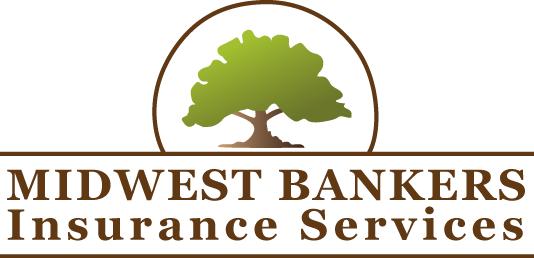
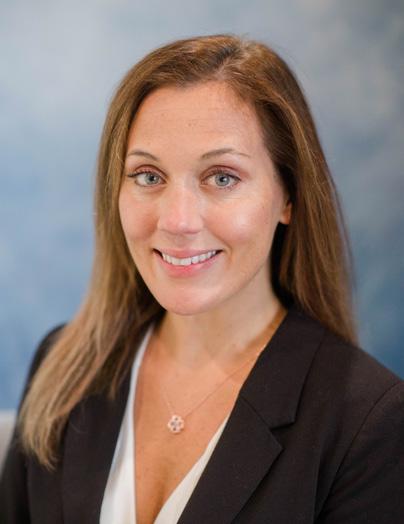

GOLF OUTING
August
15, 2024
I Trappers Turn Golf Club I Wisconsin Dells
A rainy day could not stop more than 200 bankers, WBA staff, and event sponsors from taking part in this year’s annual member appreciation golf outing! Thank you to all the bankers and event sponsors who participated to make this year’s event another successful outing!
In his brief remarks to attendees, WBA 2024-2025 Chair Al Araque welcomed attendees and reminded them of their impact to their local community, and the impact that we can have together when bankers actively engage with your bankers association.
A special thanks to our guest speaker, State of Wisconsin Assembly Speaker Robin Vos (R-63), for sharing an update on happenings at the state capitol.
WBA would like to extend our appreciation to the 37 event sponsors (listed on next page) who made this outing possible.











THANK YOU, GOLF OUTING SPONSORS
Platinum Associate Member:
• FHLBank Chicago
Gold Associate Members:
• Bankers' Bank
• BMO Correspondent Banking
• BOK Financial Capital Markets
• FIPCO
• Godfrey & Kahn, S.C.
• ICBA Services Network
• Midwest Bankers Insurance Services (MBIS)
• WBA Employee Benefits Corp (EBC)
Silver Associate Member Sponsors:
• Bell Bank
• Cinnaire
• Locknet, an EO Johnson Company
• Performance Trust
• UFS LLC
• Wipfli LLP
Bronze Associate Members:
• ADVANTAGE, powered by JMFA
• American Security and Privacy
• Arctic Wolf Networks
• BHG Financial
• Boardman & Clark LLP
• Delta Dental
• Eide Bailly LLP
• Executive Benefits Network

• Jefferson Wells
• Northland Securities
• Plante Moran
• Quad City Bank & Trust
• SHAZAM
• The Baker Group
Associate Members:
• AmTrust Financial Services
• First Business Bank
• Generations Title
• Impact Retirement Advisors
• IronCore, Inc.
• KeyState Companies
• UnitedHealthcare
• Wolf & Company, P.C.
LEADERS IN
BANKING EXCELLENCE CEREMONY
August 16 I WBA Headquarters I Madison
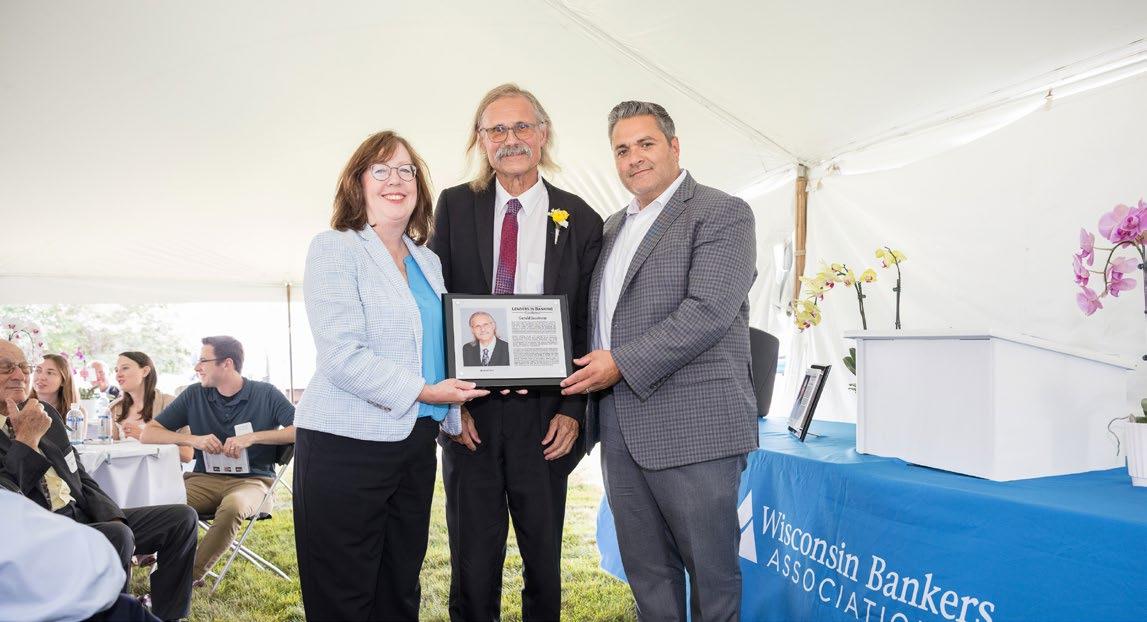

U.S. Representative Bryan Steil addresses the audience on the important




Wisconsin Department of Financial Institutions Secretary Cheryll Olson-Collins provides remarks on the positive impact of banking on the state’s primary industries of manufacturing, agriculture, and hospitality/tourism.

Jerry Jacobson (center) accepts his award from WBA President and CEO Rose Oswald Poels and WBA Board Chair Al Araque.
Tom Pamperin (left) joins his father as a Leaders in Banking Excellence honoree. Dick Pamperin was recognized in the inaugural Class of 2020.
Bill Censky (center) is pictured with his wife Nancy Censky and son Phillip Censky.
role of the banking industry in the economy and government.
The Class of 2024 was celebrated at the WBA headquarters in Madison.
The Leaders in Banking Excellence installation is viewed by nearly a thousand visitors to the WBA office each year.
Wisconsin Bankers Association Leaders in Banking Excellence
Class of 2024 Installed on Honor Wall in WBA Headquarters
Three individuals have been recognized by the Wisconsin Bankers Association (WBA) for their excellence in banking, community service, and civic involvement. A celebration was held on Friday, August 16, unveiling three new plaques on the Leaders in Banking Excellence installation at the WBA headquarters in Madison. Established in 2020, the wall now profiles 27 outstanding current and former banking leaders who have helped to shape the industry into what it is today.
Congratulations to the Class of 2024 Leaders in Banking Excellence: William Censky, former Investors Community Bank, Manitowoc; Gerald Jacobson, Northwestern Bank, Chippewa Falls; and Thomas Pamperin, Premier Community Bank, Marion.
Nominations for the Class of 2025 are welcome now through May 9, 2025, at wisbank.com/excellence.

William Censky
William (Bill) Censky began his banking career working alongside his father, Gerald Censky, who started the Manitowoc County Bank in the 1960s. After the bank was sold, Bill Censky transitioned to First Wisconsin/ Firstar. He played a pivotal role in founding Investors Community Bank (ICB) in 1997. As the initial CEO and Chairman of the Board, Censky guided ICB to significant growth, reaching $1.5 billion in assets before its sale to Nicolet National Bank in 2021. After transitioning his CEO role around 2012, Censky remained on the Board, helping ICB become a leading agricultural lender with over $1.4 billion in total agricultural loans serviced. He was also instrumental in taking the bank public and trading on NASDAQ in 2015. In addition, Censky served on the organizing boards for two other banks.
Censky’s legacy in the banking industry and his community involvement reflect his deep commitment to excellence and service. His contributions have left a lasting mark, demonstrating the power of thoughtful leadership and community engagement.
WisconsinBankers Association LEADERS IN BANKING
A short bio of each honoree is included below. Read more about the honorees and view event photos at wisbank.com/excellence or visit the WBA office to view the Wall of Excellence in person.

Gerald (Jerry) Jacobson has been a dedicated figure in banking since June 1978, contributing over 45 years of service at Northwestern Bank. Starting as a teller, he progressed through roles as an auditor, cashier, executive vice president, and president, a position he assumed in 1998. His leadership style emphasizes personal connections with staff and fostering their professional growth, demonstrated by his daily interactions with employees and regular visits to all Northwestern Bank locations.
Jacobson’s impact on the Chippewa Valley’s economic development is notable, with leadership roles in local business organizations and efforts to revitalize downtown areas. Under his guidance, Northwestern Bank’s assets grew from $150MM to $700MM, and net income increased from $2MM to $10MM. Jacobson also advocates for the banking industry and has served on various boards, including those of the Federal Reserve Bank of Minneapolis, Community Bankers of Wisconsin, and Wisconsin Bankers Association (WBA). He was honored as the 2023 WBA Banker of the Year. Jacobson’s commitment to excellence and community has left an enduring, impactful legacy.
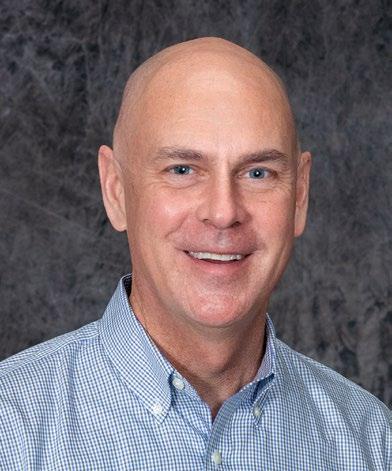
Thomas (Tom) Pamperin has dedicated more than 35 years to the banking industry and remains active in the field. He is an alumnus of the Graduate School of Banking at UW–Madison (GSB). He joined Premier Community Bank (Bank) in 1998, leading the Bank’s growth plan and expansion into insurance and investment services. In 2005, he became president and CEO of the Bank.
Pamperin’s involvement with the Wisconsin Bankers Association (WBA) is extensive. He served on the WBA Board of Directors, including as the 2013–2014 chair; on the WBA Benefits & Insurance Committee, Inc. Board of Directors, including as the 2010–2011 chair; as well as many other WBA committees. His leadership extends to GSB, where he served on the Banker Advisory Board and Board of Trustees, the Puelicher Center for Banking Education at UW–Madison, and the State of Wisconsin’s Banking Review Board. Additionally, Pamperin has served on the American Bankers Association’s Community Banker and Membership Councils. Pamperin’s career reflects a deep commitment to banking excellence and community service.
Gerald Jacobson
Thomas Pamperin

Public Relations Strategy on the Growing Threat of Overdraft Fee Lawsuits Against Wisconsin’s Community Banks
By Kathleen Rolfs
Are Recent Social Media Ads Scams or Legitimate?
Small community banks across the nation are increasingly becoming targets of aggressive law firms seeking to initiate overdraft fee lawsuits. Utilizing sophisticated digital advertising tactics, these firms entice our customers to contact a law firm if they were charged overdraft fees, likely in exploration of the possibility of a class action lawsuit. While these ads are legitimate, they typically employ ambiguous terms like “investigation” which may lead your customers to come to you with questions as to their nature. This year alone, the Wisconsin Bankers Association (WBA) has reported that many community banks in Wisconsin have been subjected to such targeted campaigns. This issue not only creates challenges for banks' marketing communications teams but also poses a significant public relations risk to Wisconsin consumers by potentially undermining trust in the banking system.
Why Is This an Increasing Problem?
According to data from Bankrate, roughly 91% of banking accounts are subject to overdraft fee structures, with this information disclosed to customers at account opening with transparent fee schedules. Recent increased media coverage on the topic has prompted some lawyers to prospect for new customers, hoping to find bank and credit union customers who may have charged their customers improperly. Some are prospecting through paid social media advertising campaigns that target consumers in the geographic area of a bank’s location. These ads are inexpensive and have a wide reach.
Should These Ads be Reported and Treated as Scams?
Some bankers incorrectly dismiss these aggressive solicitations as mere scams, viewing them as attempts by "bad actors" to obtain personal information from bank clients. However, it is best not to shrug off these ads targeting Wisconsin banks simply as scammers’ attempt to collect
information. These craftily planned advertisements represent legitimate attempts to build relationships with our customers with the end goal being a possible lawsuit. WBA Director – Legal Scott Birrenkott recently shared that some Wisconsin banks have received information requests from law firms working with customers who have responded to their advertising.
If your bank is targeted by this type of ad — and if it hasn’t been yet, it likely will be — it is crucial to be prepared. Clear communication, customer education, and proactive networking can help mitigate the impact of these campaigns.
How to Handle a Campaign Targeting Your Customers
While the actual response of each individual bank will depend upon what is appropriate for your situation, and your customer base, here are some elements to consider:
1. Transparency: Ensure your employees understand your bank fee schedule. Communicate your bank’s policies and the rationale behind them. If appropriate, consider sharing the details of any ad campaigns targeting your bank with your staff to ensure that they are aware of it because they may be asked about it when they are out in the community and may receive inquiries from customers by phone and in-person visits. Alternatively, it might be best to ignore addressing the advertisements directly, and instead focus on an independent, yet proactive educational campaign focusing on how to learn more about your bank’s overdraft services.
2. Education: Educate your customers on overdraft fees and what they can do to avoid them. In addition to providing this education at account opening, create statement stuffers or flyers with information to insert into overdraft notices that include tips on how to avoid these unnecessary fees and links to internal and external resources.
3. Networking: Collaborate with other community banks and WBA to share best practices and strategies. If you happen to notice an ad targeting other banks, let them know, even if they are your competitor. Report campaigns impacting your bank to the WBA legal team as they are monitoring these ads and have been in communication with the Wisconsin Department of Financial Institutions, Wisconsin Department of Justice, and Wisconsin Department of Agriculture, Trade, and Consumer Protection regarding the potential misrepresentations these advertisements suggest regarding bank overdraft practices.
4. Check the Meta Ad Library: If you start seeing ads, check the ad library under Meta’s page transparency feature so that you can see the campaign beginning and end dates. It seems recently that the firms run the ads for a five-day run starting over the weekend, most likely to catch the bank off guard during the weekend. With this issue being at the top of the CFPB’s agenda, it isn’t going away any time soon. It is incumbent upon us as community bankers to keep abreast of bank policy issues that are discussed in the media and to be prepared for the fallout. Awareness, education, and communication are key to ensure we effectively protect our reputation. And it’s always a good idea to let WBA know if you are targeted by these law firms so that they can continue to provide strategic resources to support us and advocate on our behalf.
Rolfs, vice president – chief marketing & communications at PremierBank in Fort Atkinson, is a member of the 2024–2025 WBA Marketing Committee.
There’s Still Time to Register for WBA’s Management Conference
Bank management teams profit from education and networking opportunities
In September, the Wisconsin Bankers Association (WBA) is expecting more than 120 bankers, including management teams from across the state, to gather in Green Bay for the annual Management Conference.

Focused on topics related to the ever-evolving banking industry, this event is the perfect opportunity for bank leaders to support growth within their institution and engage with bankers from every corner of Wisconsin.
On Monday, September 23, a pre-conference golf outing at Thornberry Creek at Oneida allows attendees to get a head start on networking with their peers. That evening, the conference will officially kick off with a reception and dinner program recognizing the 2024 WBA Lifetime Service Award recipients. This year, several individuals will be honored for dedicating over 30 years of their professional careers to the banking industry.
The following day, C-suite bankers and management team members will enjoy a full day of four general session presentations, one round of breakout sessions with four different options to choose from, time in the exhibit hall, and numerous opportunities to network among peers. Networking is a priority, so the conference is designed with that in mind.
General session speaker Frank Kelly shared insights for the article in this issue about factors bankers should consider when budgeting for 2025. His session, The U.S. Economic, Financial, and Political Outlook 2025–2026, is a “users guide” for what banks and their clients should look out for in 2025 and 2026.
The breakout sessions will be led by industry experts on topics related to deposit growth, commercial loan pricing, rethinking liquidity and funding, financial management, and a panel discussion on innovation in banking.
To make the most of the conference, and to help all leaders stay abreast of new developments, banks are encouraged to take advantage of team pricing at registration. Please visit wisbank.com/management to register.
Fueling Turnaround, Acquisition, and Expansion Solutions
We help companies overcome financial obstacles through innovative Asset-Based Lending solutions, focusing on small- and mid-market companies in transition with credit requirements from $2,000,000 to $18,000,000.

Mike Colloton – Milwaukee – 262 -792 -7180 Pete Lowney – Madison – 608 -232 - 5987
firstbusiness.bank/abl
Bulletin Board
News from Wisconsin Bankers Association Members










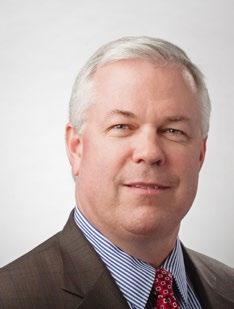

Promotions and New Hires
Appleton
First Business Bank promoted Bryson Machonga (pictured) to vice president – treasury management.
Boscobel
Community First Bank recently added Troy Ruegsegger (pictured) to the executive management team. Ruegsegger will serve as chief operations officer.
Fond du Lac
FVSBank is proud to announce that Ryan Galligan (pictured) has accepted the role of vice president, director of operations.
Howards Grove
Matt Doane (pictured) recently joined National Exchange Bank & Trust as a vice president of commercial lending for the Howards Grove office.
Hustisford
Hustisford State Bank announced the appointment of Tanya M. Ewert (pictured) to chief executive officer. Ewert will continue to serve as CFO.
Ixonia
Ixonia Bank is pleased to announce the following employees’ recent promotions: Patrick Lubar to first vice president – commercial lending, Alex Hinze to first vice president –commercial lending, Sabrina Palmer to vice president – customer solutions manager, and Morgan Cesar to vice president – director of talent development.
Lake Mills
Christopher M. George (pictured) acquired Greenwoods Financial Group, Inc. and its wholly owned subsidiary, Greenwoods State Bank.




Madison
First Business Bank announced that Ron Pak (pictured) has joined its top-100 SBA Lending team as vice president. First Business Bank congratulates Marlee Jorgensen (pictured) on her recent promotion to vice president – treasury management.
Milwaukee
PNC Bank has named Chris Marschka (pictured) as market leader for PNC Private Bank. Brighid Hillmuth (pictured) will succeed Marschka as market leader for PNC Commercial Banking. Marschka succeeds Lori Craig who retired recently as market manager for PNC Private Bank in Wisconsin.
Bank of America named Drew Slocum (pictured) as Wisconsin president.
New London
First State Bank welcomed Brooke Sprang (pictured) as senior vice president, human resources.
Oregon
One Community Bank announced the promotion of Brenda Homeister (pictured) to VP manager of commercial loan administration.
Pewaukee and West Bend Westbury Bank is pleased to announce that Ryan Petri (pictured) has been named president of Westbury Bank. With this appointment, former President Greg Remus will continue his active participation in the bank and its operations as CEO and Chairman of the Board of Directors of Westbury Bank and Westbury Bancorp, Inc. The following promotions were also announced: Jerad Yapp has been promoted to chief community banking officer, Brad LaRue has been
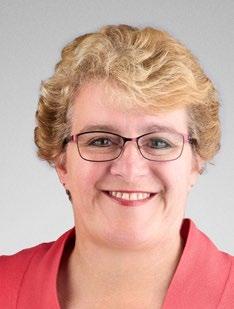



promoted to chief lending officer, and Brian Neuman has been promoted to chief operating officer.
Platteville
Mound City Bank recently announced the addition of Jackie Welty (pictured) as vice president – retail banking officer.
Waterloo
Farmers & Merchants State Bank appointed Robert Helvey (pictured) as vice president of producing mortgage sales manager.
Waukesha
Prairie Trust®, a division of Waukesha State Bank, is thrilled to announce the promotion of Terry Doyle (pictured) to vice president –director of fiduciary sales.
Retirements
Congratulations to Wanda Raasch (pictured), personal banker, who retired from National Exchange Bank & Trust on June 28, 2024.
Waukesha State Bank is proud to announce the retirement of Sue Ford (pictured) after 33 years with the bank.
Patti Kutchera (pictured), who most recently served as VP consumer relationship manager, celebrated her retirement after 41 years with Unity Bank.
In Memoriam
The Wisconsin banking industry recently lost three leaders. WBA staff extend their condolences to their families, friends, and banking colleagues.
John W. "Jack" Johnson passed away at the age of 92 on July 27, 2024, in Spring Green. Johnson was a lifelong banker who began his career at American Exchange Bank in Madison. He went on to work with the State Bank of Spring Green, Farmers State Bank, Valley Bank, M&I/BMO, and The Peoples Community Bank where he served on the board until 2021. Johnson served as WBA President in 1984.
Rowland “Rollie” McClellan passed away on July 14, 2024, at the age of 95. McClellan worked in the banking industry all of his life, most notably serving as Chairman of the Board and President of Bank of Wisconsin (which is now BMO Janesville). McClellan served as WBA President in 1986.
Deloris “Dee” Sims, one of three cofounders of Legacy Bank in Milwaukee, the first African American, womenowned charted bank in Wisconsin, passed away recently at the age of 81.
Announcements
Brookfield
North Shore Bank was named a Milwaukee Journal Sentinel Top Workplace for the twelfth time.
Congratulations to the following banks for being recognized as Independent Community Bankers America’s (ICBA) Top Lenders of 2024 in this month's issue of Independent Banker: Ergo Bank; The Bank of Kaukauna; Northwestern Bank; Bank Five Nine; Lake Ridge Bank; Horicon Bank; Citizens State Bank; Great Midwest Bank.
Mequon
North Shore Bank opened its new, full-service Mequon branch located at 11317 North Port Washington Road to the public on August 19, 2024.
Deerfield
The Bank of Deerfield recently broke ground on a new building. Its 45-yearold main branch located at 15 S. Main St in Deerfield was demolished to clear the way for a new, larger building. The new project, slated to be completed in the spring of 2025, will nearly double the square footage of the original building.

Ruegsegger Galligan Doane Ewert George Pak Jorgensen
Marschka Hillmuth Slocum Sprang Homeister Petri Welty
Machonga Helvey
Doyle Raasch Ford Kutchera
Bulletin Board
News from Wisconsin Bankers Association Members
Celebrating a Lifetime of Service
WBA is proud to recognize the individual bankers who dedicate their service to our industry and their community. The 50- and 60Year Clubs recognize bankers who have served in the banking industry for 50 and 60 years, respectively. Additionally, WBA’s Lifetime Service Awards recognize bankers who have served in the industry for between 30 and 49 years. To recognize a banker for the esteemed honor, please visit wisbank.com/ServiceAwards.

Horicon Bank
Al Schwab, chief business banking officer, executive vice president, was presented a WBA Lifetime Service Award on June 25, 2024, for 43 years of service to Horicon Bank and the Wisconsin banking industry. Pictured (left to right): Daryll Lund, WBA EVP and chief of staff, Al Schwab, and Fred F. Schwertfeger, Horicon Bank CEO.
Community Involvement

One Community Bank made a $30,000 donation to the Sun Prairie Public Library. Pictured (left to right): AVP Mortgage Loan Officer Renae Stafslien, President and CEO Steve Peotter, Executive Director of Sun Prairie Public Library Foundation Theresa Stevens, Director of Loan Review and Sun Prairie Public Library Foundation Board Member Caleb Martin, and VP Commercial Banking Officer Kelsey Hudson
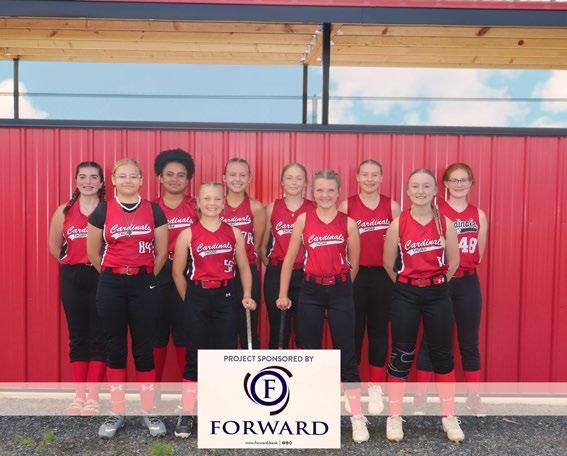
Forward Bank has donated $10,000 towards the Thorp Youth Softball Dugout Construction Project. Pictured: The Thorp Cardinals 14U youth softball team.

The Bank of New Glarus
Amy Smith with The Bank of New Glarus in Darlington was presented with a WBA Lifetime Service Award in celebration of her 44 years in the banking industry. Pictured (left to right): The Bank of New Glarus President/CEO Ron Schaaf, Amy Smith, and WBA EVP and Chief of Staff Daryll Lund

Peoples State Bank (Wausau) provided a $30,000 grant to Expressions Dance Institute, LLC of Rothschild. The money is part of a Federal Home Loan Bank (FHLB) of Chicago “Community First Accelerate Grant” to support the growth and development of small businesses in Wisconsin and Illinois. Pictured (left to right): Erik Rajek, SVP/chief credit officer, Peoples State Bank; Emily Zimmerman, owner/director, Expressions Dance Institute; and Seth Wage, VP/commercial banker, Peoples State Bank.
Milestones in Industry Service

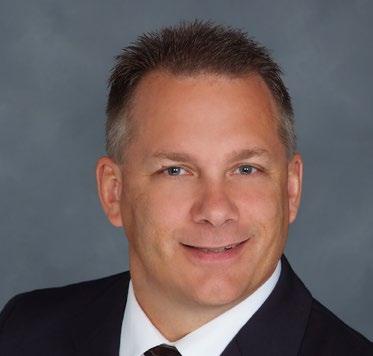
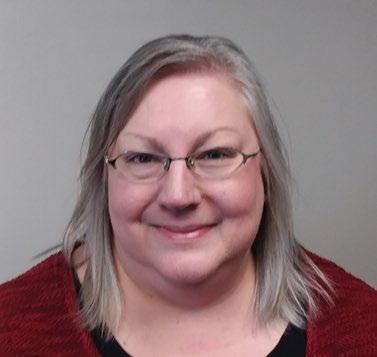


Badger Bank stepped up to support local children and families facing food insecurity with the launch of its Summer Food Kit initiative. On Juneteenth, the bank was closed for the federal holiday and the bank decided to continue its theme of taking that day to volunteer in the community.
Pictured: The Badger Bank team in action on Juneteenth.

The International Bank of Amherst jumpstarted a fundraising campaign for a three-phase expansion of the Jensen Community Center with a $100,000 sponsorship. Pictured: President of International Bank of Amherst President Butch Pomeroy with area youth and volunteers.
See more good news about Wisconsin’s banking industry, including recent hires, staff achievements, and community involvement at wisbank.com.
Have news you’d like to share? Please complete the submission form at wisbank.com/bulletin.
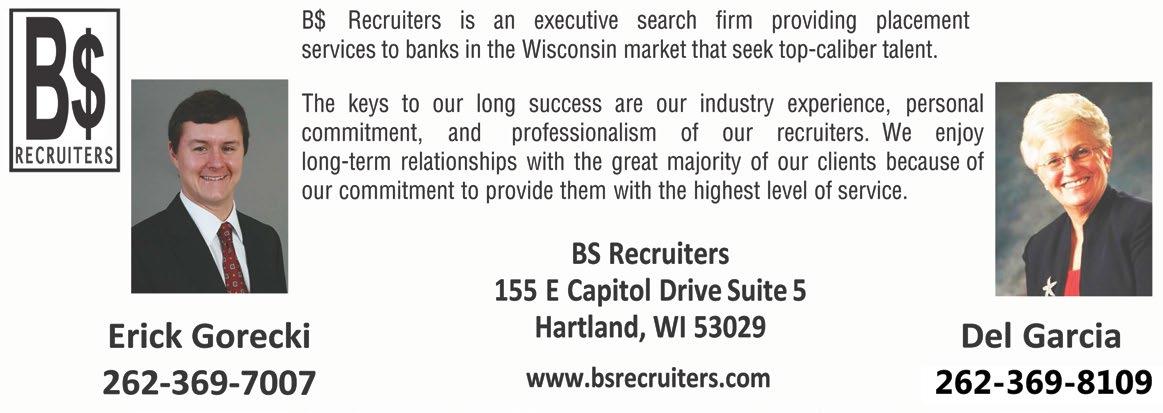
Dan Lenz recently celebrated 25 years of service at National Exchange Bank & Trust.
Wendy Soyk celebrated 25 years of service at National Exchange Bank & Trust in early June 2024.
Jeff Hayes recently celebrated 30 years of service at National Exchange Bank & Trust.
Sharon Weidling celebrated 30 years with Bank of Mauston.
Strategic Budgeting for 2025: Key Considerations
Continued from pg. 1
consumer spending increase, but at a slower pace than what we saw in 2023 and so far in 2024.” Faucher added, “banks need to be prepared for the fact that we may still see some softer demand for borrowing out there.”
“As the labor markets soften, we're witnessing both smaller job gains as well as slower wage growth…I think we're going to see more pressure at the lower end of the income distribution,” which Faucher explained is, “having more of an impact for low-wage workers and workers with less formal education.” But, he points out that upper income households are still benefiting from rising home values and stock prices that have been up over the past year, “I think higher income households are generally doing better, so retailers that are appealing to upper income households will hold up better than retailers focused on middle income or lower income households.”
Goods prices are down slightly over the past year, and Faucher points to progress over the last few months, particularly with less housing inflation. “We've seen a lot of supply come online in the multifamily market, and that's slowing housing inflation,” he stated.
Commercial Real Estate Worries
Faucher underscored concerns about the commercial real estate market, especially the office market, “there's a lot of debt that was rolled over from when interest rates were low in 2020–2021 that is going to be coming due.” This places stress on borrowers and office values are down from where they were before the pandemic. Said Faucher, “we just have lower structural demand for office space out there, so I think that banks should be prepared for distress in commercial real estate, in particular in the office real estate market.” He predicts that it will take time for that market to get through some of these structural issues and envisions a lot of ups and downs for another couple of years.
Fed’s Goals
Faucher believes the Federal Reserve won’t need to see inflation at 2% before cutting rates, stating “I think as long as
we're making progress there, we'll see the Fed cut rates in September, maybe in November or December later this year.” He added, “but I think we will see, in particular, the short end of the yield curve move lower over the next year or so, with the Fed cutting fed funds rate and pushing down short-term rates.”
Marc Gall is senior vice president and asset/liability strategist, BOK Financial Capital Markets. BOK Financial Capital Markets is a WBA Gold Associate Member and specializes in balance sheet and investment strategy for financial institutions. Gall has been a frequent presenter at WBA seminars, webinars, and conferences.
Funding Balance Sheets
A challenge for banks will be looking at deposit rates. Gall asked, “If the Fed cuts interest rates, how much cost savings can banks reasonably assume, and how quickly can they assume that they're going to get it?” Gall posed more questions for banks to consider, “what actions will banks need to take to reduce deposit costs? Is it going to be subject to whatever the rest of the market does?” For example, if competitors don’t start lowering rates on deposits and your bank still has CD specials at higher rates, will your bank aggressively move rates down and be an outlier, risking the loss of those deposits?
These are challenges from a strategic standpoint that management teams are going to have to figure out as they formulate their budget for 2025, because that cost side is going to be particularly important.
Yield Curve Pressures
As the front of the yield curve has inverted more, reinvestment rates on term loans and investments have declined from the beginning of summer. Gall suggests management teams take a hard look at loan growth assumptions for 2025: With a potentially slowing economy, where will loan demand come from? What loan rates are reasonable in this environment? With inconsistent pricing in the market, what growth and pricing strategy is best for our bank? Gall explained that many are feeling the pinch of margin pressures in 2024, but it might potentially get worse, or not get meaningfully better until significant movements from the Fed. “The initial 25
basis points or 50 basis points may feel like a movement in the right direction.” But, he warned, “the inverted yield curve is still going to be painful until we get that to normalize.”
Gall shared,“while the two-to-10year part of the curve has uninverted or become more flat, we still have a huge inversion on the short end between zero and two years, which to me creates more of the margin pressure for a lot of community banks and it’s almost getting worse right now versus getting better. For many, margins will likely improve with a more favorable curve and time passing, allowing for repricing of legacy assets.”
Bank Term Funding Program
Some banks ended up utilizing the Bank Term Funding program from the Federal Reserve in response to the bank failures of early 2023, Gall explained, “with the attractive borrowing rate, call option and favorable collateral treatment, some of the banks that we work with borrowed or refinanced it in December or January of last year, which means those are coming due December 2024 or January 2025.”
Many banks will need to consider how they want to refund those borrowings, advised Gall, adding “Given the program isn't currently available, a thoughtful, strategic funding plan will be critical for banks, incorporating current cost, diversification and contingency funding needs in the decision process.”
Frank Kelly, founder and managing partner Fulcrum Macro Advisors, will be the Keynote Speaker at the WBA Management Conference on September 24 in Green Bay. His presentation, The U.S. Economic, Financial, and Political Outlook 2025–2026, will provide more insights to use in budgeting.
Capital Rules, Cannabis, and Cybersecurity
Kelly described large banks’ efforts to stave off increased capital requirements, “there's this question of ‘too big to fail’ that still lingers after the 2008 financial crisis,” which factors into the debate about Basel III minimum capital requirements. “It's been one of the more brutal lobbying battles I have ever seen in my life, and I'm a fifth generation Washingtonian who grew up on this stuff.”
When asked to comment on how the election might influence regulatory issues, Kelly responded, “The first one would be the bank capital rules impacting the largest banks. If Trump wins, I predict that the federal regulators would probably stop pursuing it. If Harris wins, they will continue to press for it.”
A potential huge shift and possible opportunity for many banks is banking for cannabis, although, as Kelly pointed out, “it's fraught with a lot of concern.” Kelly went on to predict that Congress may try a last-minute push to legalize cannabis banking this fall. Which as Kelly predicts, could then “be a very large business for banks of all sizes because they'll be able to take the deposits, they'll be able to make the business loans to them.” He likens it to the lifting of Prohibition in terms of new financial opportunities.
Kelly’s final issue on his “big three” list of issues for bankers to consider is cybersecurity. He points out that it is getting increasingly more perilous for every business, but particularly banks becoming a target of not just cyber thieves, but also foreign governments.
He gave the cautionary examples of disruptions in Paris’ transit system on opening day of the Olympics and an elaborate deepfake video call netting scammers $25 million from a multinational firm in Hong Kong, even when employees had made efforts to avoid fraud.
Cyber criminals could target smaller banks in the heartland, Kelly warns, because “that will really shake people up more and create confusion.” Criminals and bad actors in foreign governments could reason, “don't do it in the big cities where there's always confusion… do it at a smaller, more vulnerable bank.”
Anxiety and Emotions
WBA spoke to Kelly on the morning of the dramatic market drop, and he remarked, “The market is very emotional, which is never a good thing in finance.”
“Inflation has really impacted folks. It's very uneven around the country in terms of those feelings. Meaning some people think things are great, but there's a lot of people with a lot of anxiety.” Fueling that anxiety is a lack of understanding about what's going on politically and
economically. Kelly reflected, “So much of the market is psychological and when people are feeling that anxiety, at some point it sort of bursts out.”
Look to WBA for More Information on Factors Influencing Budgets
While there are numerous complex considerations for banks as they work to create budgets that are resilient and adaptable, some factors are becoming more significant. Banks are expected to increase their technology spending with a focus on enhancing digital banking platforms, improving cybersecurity, and leveraging artificial intelligence (AI) for customer service and risk management. Other areas requiring a larger piece of the budget pie are wage growth and costs associated in upskilling or reskilling, particularly in specialized areas such as cybersecurity, data analytics, and digital transformation. WBA endeavors to keep members abreast of developments with these ever-evolving issues impacting budgeting and will continue to share informed insights, data, and best practices. Reiser is WBA writer/editor.
A Full-Service Partner You Can Bank On.
Quad City Bank & Trust is committed to building long-term relationships by providing the right tools and personalized service.
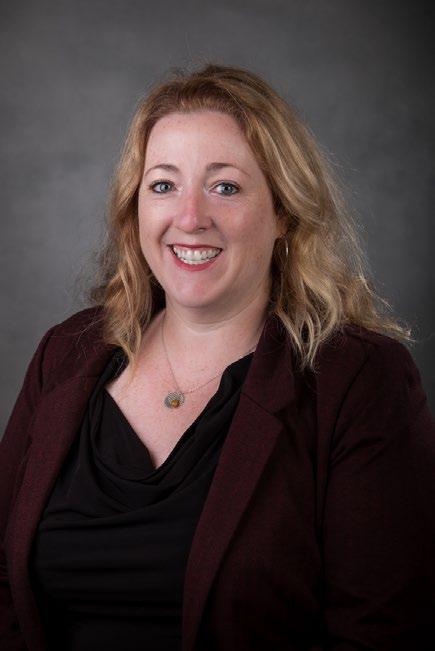

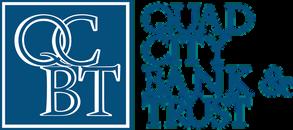


Guarding the Vault: Strategies for Banks to Combat Ransomware Threats
Ransomware, a crippling cybercrime which can lock up a company’s data in return for payment of a ransom before user access is restored, is big business. In 2023, victims reportedly paid out a record of more than $1 billion in ransom. Earlier this year, stories surfaced of one institution paying out a record $75 million ransom.
Exact trends are hard to pin down — the cybercriminals tend to overstate their successes, while ransomware victims are reluctant to publicize payouts — but for any business, ransomware represents a tremendous threat, according to Brad Robinson, the senior director for cybersecurity policy for the Conference of State Bank Supervisors (CSBS). And for the financial sector, and community banks in particular, “the threat is existential,” he warns. “If you're not prepared, if you're dead in the water and you can't communicate with customers and you can't do business, it can be become a safety and soundness issue with your institution very quickly.” Smaller community-based financial institutions simply don’t have the resources to withstand a prolonged outage or closure.
Ransomware is just one subset of cybercrime, a wide variety of criminal actions that prey on the modern world’s digital connectedness to commit identify theft, fraud, scams, data breaches, and other malicious acts. In a ransomware attack, perpetrators infiltrate an organization’s digital network and prevent access to its data (often by encrypting the data), demanding a ransom before access is restored. Even more troubling is that cyber criminals continue to evolve their attacks, with some now employing double or triple extortion demands, requiring additional ransom for not publicly sharing the data or contacting the victim’s customers directly.
Jeff Otteson, vice president of sales for Midwest Bankers Insurance Services, a WBA subsidiary and Gold Associate Member, says the banking industry represents a plum target. “Cyber criminals feel if they can crack into financial institutions and encrypt their data, infiltrate any back up system and also encrypt that, there’s a pretty big payload” waiting for them, he explains.
by Malcolm McDowell Woods
It’s a frightening scenario.
However, there are steps financial institutions can take to help secure their data and ward off ransomware attacks.
Rob Foxx is the director of information security and IT services for Madison-based FIPCO (Financial Institution Products Corporation), a WBA subsidiary and Gold Associate Member. Foxx performs information security audits for financial institutions, assessing their vulnerability to cyber attacks. The goal is to keep data safe and secure. The challenge is that criminals are constantly evolving their methods. “Their technology is advancing and becoming ever more sophisticated,” says Foxx. While the banking industry’s available defense systems are also evolving, Foxx points to what remains the weakest link in the armor — personnel.
“By and large, the quickest, easiest, and most common way they get in is by attacking the human element,” he says. “They will send an email that will cause fear and panic, requiring you to click on it, or to fill out information. You know, that’s the classic way. And it's become more sophisticated because they use artificial intelligence (AI) to generate their letters.”
That means education and training throughout the workforce is critical. “The employees are the weakest link,” says Robinson. “They always will be. That's just human nature, and the bad guys know it.”
The key is practicing what he calls basic cyber hygiene, protecting your perimeter. Foremost is training and educating staff on proper information security.
That includes utilizing multi-factor authentication, ideally throughout the workforce, but particularly for admin level, or privileged, users. “We're talking soft tokens on your phone or, you know, actual physical key tokens that you carry around that plug into a USB,” says Foxx.
Next is securing your data. Otteson points to the 3-2-1 rule. That means that maintaining three copies of your data, using two different types of media and storing one copy off-site. “That way, your data can be restored without paying ransom, suffering any downtime, or losing any data.”
Your entire network should be safeguarded by up-to-date anti-virus
software. “And it’s not the same antivirus software you use at home. You want something that's enterprise level, next generation, usually, with AI and heuristic analysis in it.” All software ought to be up to date, to reduce the possibility of what are known as zero-day exploits. “If your systems are out of date, you can have all the other controls in the world in place, but known vulnerabilities are easy-ins for bad guys,” says Foxx. “Those are flaws in your software, your operating system, or pretty much anything else on your computer that hasn't been identified or patched by the companies that put it up.”
How do you know if you are taking the necessary steps? No doubt, your insurer will ask, but there are other tools you can use.
The Bankers Electronic Crimes Taskforce, state bank regulators, and the United States Secret Service collaborated to develop a tool which financial institutions can use to assess their vulnerability to ransomware attacks. The Ransomware Self-Assessment Tool, or R-SAT, was created to encourage discussions about preparedness, says Robinson. It’s freely available for download on the csbs.org website.
The tool, a list of 20 questions, isn’t designed to produce a score or rate a bank’s preparedness, but to identify potential weak links. “The whole purpose is to get folks talking about it within their institution,” says Otteson. “It's not terribly hard to complete, but it forces people who complete it to look at the answers to the questions. It talks about instant response, employee training, multi-factor authentication, backups, how you control access to your system, to your vendor relationships. Those are all sorts of foundational things that every institution — big or small — can look at to protect themselves against ransomware.”
Taking the necessary steps will not only provide greater protection for your institution, but likely result in a lower premium. “Without multi-factor authentication in place on emails, or for privileged users, it’s very hard to secure strong terms and conditions on a cyber policy,” notes Otteson. He says a recent flattening of rates in the cyber insurance market is proof that financial institutions are doing a better job of protecting their data.
Still, it only takes one successful attack to wreak havoc. “You can always get blindsided,” admits Otteson. “The best financial institutions with the best cybersecurity platforms and teams and expertise can still get caught off guard. And we do the best we can to secure systems and deploy security patches, and train staff. But from what we've seen in general regarding cybersecurity incidents is it has been employees, clicking on links they shouldn’t have,” or it's been a security patch where the IT team assumed it had been implemented and deployed, or someone not utilizing MFA. In addition, the industry has experienced an increase in vendor privacy incidents, the owner of the customer data is liable for it, even when shared.
And if your bank is targeted? Usually there are obvious, frightening signs, such as all of your computer monitors flashing “PAY US MONEY” in unison.
“If you've had an IT or information security audit, you are going to have a disaster recovery and incident response plan in place or are in the process of developing them,” says Foxx. "Once

you've discovered that yes, we have an incident, that somebody from the outside is in and our data may have been compromised, I immediately want to get insurance and legal involved.”
When an attack happens, Otteson says he connects with the insurance company to set up a meeting of their breach response team. Legal counsel is quickly brought in, partly to protect attorney client privilege. “Everything gets run through legal,” he says. “They will bring in a forensic firm to attempt to unlock, or decrypt, the data.” They will assess the depth of the data breach — whether the attackers reached the backup systems — and try to determine the identity of the attackers. Legal counsel will provide advice about communicating with others about the attack, helping you craft appropriate language. Finally, ransomware negotiators will be brought in. According to data collated by Comparitech researchers, almost 1 in 5 ransomware attacks led to a lawsuit in 2023. Over the past couple of years, lawsuits filed following ransomware attacks have increased, with the overall
average over the last five years standing at 12 percent.
It’s the stuff of nightmares, but Otteson notes that ransomware payments have dropped through the first quarter of 2024, and he credits it to the industry taking the issue seriously, with strong and robust cyber security, employee training, secure data backups and by staying ahead of the internal controls required by the insurance company. “Hey, doing the basics will take you a long way in protecting your institution. It's not about a huge capital spend on crazy systems and whatnot. We want to keep you from letting people in the door to begin with.” The attacks are getting more sophisticated but by and large it’s the basics that are the most common successful means of entry.
McDowell Woods is a freelance writer and an instructor of journalism and media studies at the University of Wisconsin–Milwaukee.


ABA AGRICULTURAL BANKERS CONFERENCE



November 12–15, 2024
Baird Center | Milwaukee, WI
Get strategies to support your institution’s future and plan for growth at the nation’s premier conference for ag bankers.
We’ll look at what’s in store for ag this year and beyond, from Farm Bill reauthorization to artificial intelligence and more.

Each Bank Is Unique … Your Counsel Should Be


Too

There are 4,568 banks in the country.1 The breadth of issues facing those banks vary greatly, as do the resources each bank has at its disposal. Community bankers deserve legal counsel that takes into account the specific needs, goals and ambitions of each individual bank – counsel that consistently delivers sophisticated, yet practical legal advice tailored to your particular situation.
While we work with dozens of community banks throughout the country, and can leverage that



Melissa Y. Lanska 414.298.8706 mlanska@reinhartlaw.com reinhartlaw.com
experience and perspective for you, we understand that the challenges and opportunities facing your bank are frequently unique to you.
At Reinhart, our dedicated attorneys function as a seamless extension of your management team, working alongside you to help solve even the most complex situations facing your financial institution. In many instances, it’s not just providing legal advice, but leveraging our network of contacts to serve your needs. It’s what we call Partnering in Possibilities™. 1




WBA FLEX Retail & Marketing Summit
The WBA FLEX Retail & Marketing Summit kicks off on November 20 at 9:30 a.m. and adjourns at noon on November 21. Join your fellow retail, sales, and marketing peers from around the state at Glacier Canyon Lodge & Convention Center in Wisconsin Dells.
You can expect over eight hours of presentations including general and breakout sessions – as well as ample time to network with your banking peers and get inspiration in the vibrant vendor hall. The three tracks are sales/marketing, retail, and financial literacy.
Keynote speaker Dima Ghawi’s presentation, How to Future Proof Your Company: Engaging Teams Across Generations, will reveal lessons derived from her experience globally training, developing, and engaging over 500 millennials for Fortune 100 companies. Ghawi explores the
keys to unlocking the millennial mind in order to better engage them in the workplace, give them the purpose they crave in their work, and inspire them to overachieve. Additionally, two award ceremonies will be featured during the Summit. The Wisconsin Bankers Foundation will recognize the efforts of individual bankers and banks involved with financial education in their communities. The second annual WBA Marketing Excellence Award will be presented to one member bank that demonstrated an innovative marketing campaign. Note: if you are interested in applying for the Marketing Award, submit your bank’s information to wisbank.com/MarketingExcellence by September 30.
Visit wisbank.com/FLEX to see the complete agenda, check out the speakers, and to register online.







Was the CrowdStrike Incident a Fluke or the Beginning of a Trend?
By Rob Foxx
On July 19, 2024, CrowdStrike pushed out an update to their customer base that disabled an estimated 8.5 million computer systems across the world. This not only damaged their reputation, but it also sent fear and uncertainty into those businesses that utilize IT services. This single event cost about $5.5 billion in damages and business loss.
The real question is who can be affected by an event like this. The short answer is anyone who uses any products or services that can affect the system files of a computer. This includes Microsoft Windows automated updates, antivirus, remote configuration tools, and many others. For those who are not familiar with the previously mentioned list you
have several of these on any given business computer.





So why do we not hear about events like this more often? The reality of the situation is these events happen every day. Windows updates pushed out by a managed service provider that removes all network drivers, thus disabling the connection to the login service rendering a computer useless, was my personal CrowdStrike. This happened several times over the course of a month, anti-virus similar to CrowdStrike that disables use of business-critical software or core access. An update to Windows that prevents backup software from running correctly. These have all happened. Most people have never heard of these events as they did not have a worldwide impact or cost billions of dollars in losses. CrowdStrike made news because of their wide adoption as they offer a service only a handful of other companies do.
Our team of professionals offer consulting and shared service solutions:
• Compliance and risk management
• Operational efficiency and tactical planning
• Ongoing monitoring of regulatory disclosures
Contact FIPCO’s Jeff Schmid to get started.
contract renewal, you can verify or request that they add in testing criteria before sending out updates. Comparing vendor services with an RFP (Request for proposal) can identify whether a service fits your needs. Several similar companies allow for the designation of a test group which includes a sampling of computers across your organization. This group should fill all the key roles to running your enterprise and test for a week or more before the updates are pushed to the rest. Perhaps one of the best means to protect yourself is to have knowledgeable IT on staff or as an on-call vendor. The fix to restore CrowdStrike would take per computer less than 10 minutes at a keyboard. A little longer if the computer has BitLocker or other similar protections in place. A good recovery plan and continuity for running on alternate systems can also save quite a bit of recovery time.
I do belive there will be more events like the CrowdStrike outage, especially given how large some services grow to global offerings. I belive vendors will be more cautious in their products. Will you be more cautious in your implementations?
Foxx is director – infosec and IT audit services for FIPCO. He can be reached at rfoxx@fipco.com or 608-441-1249. For more information about FIPCO forms, software, or other products, visit fipco.com, call 800-723-3498, or email fipcosales@fipco.com
FIPCO is a WBA Gold Associate Member. jschmid@fipco.com 608-441-1220 www.FIPCO.com

So how do I protect my organization? The only 100% means of protecting your computer environment is to power it down, unplug it, and bury it in concrete. Business, however, runs on acceptable risk, so let us look at what could help lower your risk and impact. During the course of onboarding or reviewing a vendor for


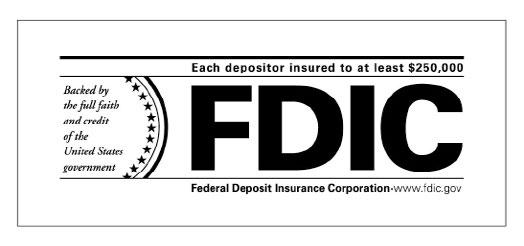

It’s Back-to-School Time!
Upcoming education opportunities for Wisconsin bankers Fall has arrived and schools are back in session, and that means your WBA banking schools are back in session as well! Every school offers in-depth learning experiences for various roles of staff within your bank. Each school will be held at the WBA office in Madison in our Engagement Center, unless otherwise noted. Visit wisbank.com/education for more information about these schools and to register your team.
Personal Banker School | September 30–October | Full
• Designed to help teach personal bankers the techniques and knowledge needed to successfully sell, cross-sell, refer, and service the banking industry’s ever-expanding list of financial products.
Consumer Lending Boot Camp | October 2–3
• Developed to help build the foundation and skills necessary to become a successful consumer lender or processor. During the course, students will learn, and put into practice, the process of basic lending.
Commercial Lending School | October 8–10
• Advanced-level program assuming participants have work experience and prior training in commercial lending and/or financial statement analysis.
Deposit Compliance School | October 15–17
• Designed to provide a strong foundation of the various deposit regulations affecting banks, the current trends in compliance, and the resources needed following the school.
Principles of Banking | October 15–16 (Black River Falls)
October 29–30 (Fond du Lac)
• Intended to give those who are new to banking a general understanding of the industry, this school provides a comprehensive introduction to the banking industry, fundamental banking concepts and principles, and much more.
Supervisor Boot Camp | October 21–22
• Interactive workshop geared at new and experienced supervisors who are looking to expand their leadership skills and succeed as a highly effective supervisor.
October 10–11, 2024 I The Edgewater Hotel, Madison

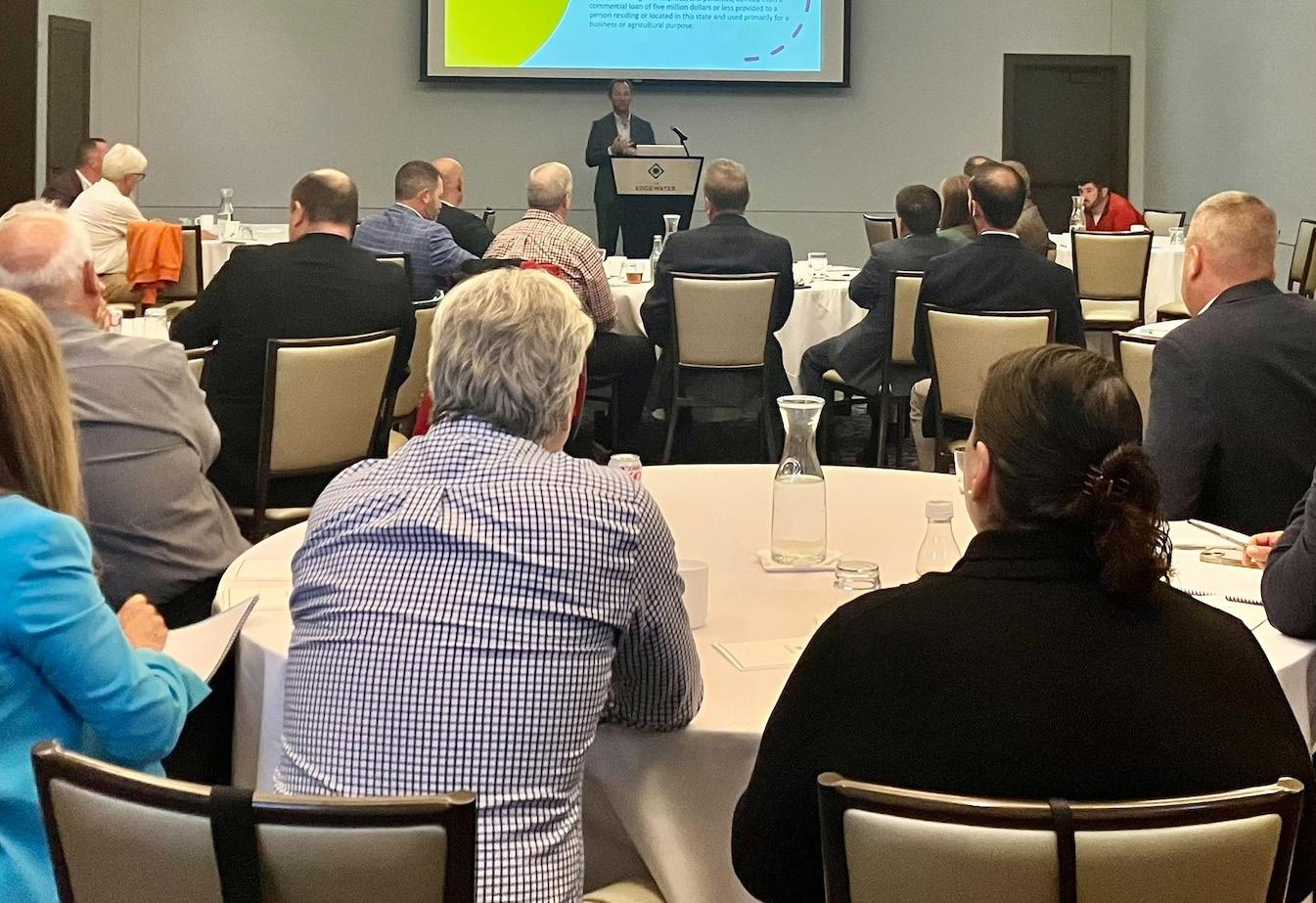
Thank you, Package Holders
Thank you to the WBA Platinum, Gold, Silver, and Bronze Associate Member companies for their continued support of the banking industry and the Association. These companies provide services, information, and products that help Wisconsin banks serve their customers and communities. Thank you. Please visit wisbank.com/associates for more information about these companies.
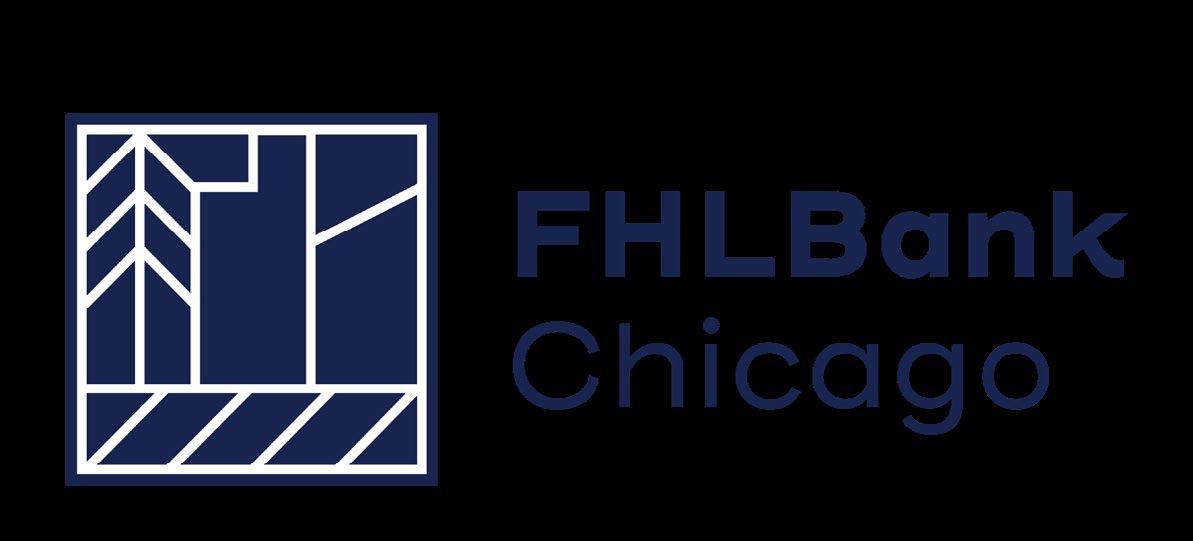

Correspondent Banking
















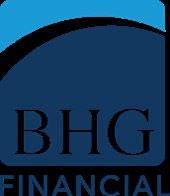

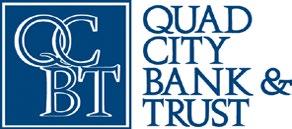
B ANK TE CHNOLOGY OUTFIT TE R
WBA Platinum Associate Member
WBA Gold Associate Members
WBA Silver Associate Members
WBA Bronze Associate Members
Recent Staff Announcements

Kris Mertins-Elliot has been promoted to assistant director – compliance and management services at FIPCO. Kris will be responsible for contract management, new client engagements, and future staff development of ShareFI team members.

Chad Dunemann has been promoted to assistant director – cloud operations and support. Chad will be the lead for AWS administration of the next – gen Compliance Concierge SaaS environment, client deployments, and will continue to provide technical and integration support for FIPCO’s classic and modern Compliance Concierge software solutions.

Jeff Wagner joined the WBA Employee Benefits Corporation, Inc. team on August 15 as vice president. Jeff has over 16 years of experience selling in the healthcare industry. He has worked with Humana, Anthem, and most recently, Trustmark as an executive sales consultant.


WBA EBC Offers Benefits That Your Employees Want and Need
By Daryll Lund
As banks across the state are developing their budgets for 2025, it’s an ideal time to talk about how tapping into the benefits offered by WBA’s subsidiary, Wisconsin Bankers Association Employee Benefits Corporation, Inc. (WBA EBC) makes sense from a financial standpoint but also underscores your commitment to prioritizing employee health, well-being, and their own financial best interests. WBA EBC’s comprehensive offerings of health benefits (dental insurance, medical insurance, prescription drug plans, and vision) and life and disability insurance can help make your bank a soughtafter employer.
WBA EBC is able to offer member banks high-quality benefits at attractive pricing, which is typically only available to large employers because of the combined purchasing power of Wisconsin banks.
WBA EBC knows banks! The team understands how competitive the job market is and that benefit packages play a key role in the attraction and retention of top talent in the financial industry. Their focus is on finding solutions and then providing unparalleled service when it comes to answering questions and ensuring member satisfaction. Additionally, WBA EBC has pulled together the information you need in an online portal that is easy to navigate and serves as a one-stop-shop for enrollment and billing administration.
Beyond providing employees of Wisconsin banks with access to competitively priced and flexible medical and vision coverage through WBA EBC’s Association Health Plan, which is serviced by UnitedHealthcare, employees and their covered spouses have the opportunity to each earn $1,000 through UHC Rewards. UHC Rewards participants can earn rewards in many ways: tracking daily steps, taking a health survey, getting an annual checkup or biometric screening, etc. The program is included in UHC health plans at no additional cost.
Helping your employees earn rewards as they reach their health and wellness goals is a win-win and shows that your bank is dedicated to the success and healthy futures of employees.
Offering employees enhanced peace of mind is another way to distinguish your bank from others. WBA’s partnership with Lincoln Financial Group offers competitive pricing on high quality life and disability insurance with value adds like Travel Connect and Life Keys (with life insurance) and an employee assistance program (with long term disability insurance).
To learn more about WBA EBC’s varied and robust options for your bank, please contact Brian Siegenthaler at bsiegenthaler@wisbank.com.
Lund is WBA executive vice president – chief of staff and president of EBC and MBIS.








Community Advocate Spotlight

Wisconsin bankers are the definition of “community advocates” in all that they do every day to improve their local economy through bank products and services, as well as through generous philanthropy of time and money. The Community Advocate Spotlight shares and celebrates the diverse backgrounds, experiences, perspectives, and innovation of some of the extraordinary bankers in the state.
Questions and Answers
The following is a brief interview between WBA President and and Farmers State Bank of Waupaca
How did you get started in Banking?
It was really by chance that I became a banker. I had just graduated college in 1983 with a degree in accounting. I’m from Marshall, Wis. and one day shortly after graduation I received a call from our local banker, Melvin Martin, who was at the time the executive vice president at Farmers & Merchants State Bank of Waterloo & Marshall and a family friend. He knew I had graduated, and he asked me what my plans were and if I ever thought about working in a bank. I never gave banking much of a thought, but decided to interview for the position and was hired. Here I am 41 years later, still proud to be a community banker. Melvin was a wealth of knowledge when it came to business and banking. I was very fortunate to train with someone who was so willing to share that knowledge, which has helped me throughout my banking career.
What is your favorite aspect of your role at the bank?
I enjoy all the aspects of my job. I’m really fortunate to work in a community where you get to know so many of your customers, and I enjoy being able to sit down with them and hear their stories and find out what we can do to help them with their personal or business needs. I’m also very blessed to be part of such a talented and committed Board and staff that make our customers and communities we serve, their number one priority.
What do you wish the general public understood about the banking industry?
I wish the public understood that when the term ''bank'' is used, we are not alike. The community bankers play such an important role in our markets. We take the time to listen to our customers, help them find solutions to their concerns and when loan decisions need to be made, they are made locally. I also

don’t think the public understands how much the community banks financially contribute, large or small, to clubs, local events, charities, and sports teams in our communities. Our employees are also volunteering their time to support these events. In many cases, the credit unions and large banks only seem to focus on their larger markets when it comes to contributions.
Where do you believe the industry’s greatest challenges are in the next three to five years?
Keeping up with the ever-changing technology and the costs that are associated with new technology will be a challenge for community banks along with cybersecurity and making sure customer information remains safe in our institutions.
Being able to navigate through all the regulatory changes that continue in our industry and making sure we have compliance people on staff who can keep up with the changes is another challenge.
Finding, retaining, and developing staff who can step into leadership roles as baby boomers exit our industry via retirements will be key in keeping community banking alive and well into the future.
Please describe your current role at your bank and share with us one of your more rewarding experiences.
As CEO I have had several rewarding experiences during my career, but I would have to say that as difficult as it was during the first few months of COVID-19 in 2020, it was remarkable to see how our staff was able to handle the volume of PPP loans, stimulus checks, and mortgage loan refinances that all came at us at once. Everyone rose to this tremendous challenge, worked as a team, and did their part to make sure our customers were taken care of in a timely and efficient manner given the circumstances we were dealing with at the time with our lobbies closed and sometimes working with limited staff.
Bankers Marketplace
We have an opportunity to join the Premier Community Bank team as a Full-Time Compliance Specialist. Start your career journey with us and apply today!
If you are a person who excels in a dynamic environment with a knack for compliance, this job is made for you. Don’t miss out on an opportunity that aligns with your unique strengths! Responsibilities include:
• Assist the Compliance Officer with special projects, for example, work associated with regulatory change management.
• Assist in regular reviews and monitoring of Bank activities to ensure compliance with applicable laws, regulations, and internal policies.
• Assist in the development and implementation of internal controls to mitigate compliance risks and ensure effective monitoring.
Skills Preferred:
• Expertise with internal controls assessment, risk assessment, design and development of audit programs, testing, process flowchart.
• Good understanding of financial products and services and financial institution policies and procedures.
• Strong analytical and problem-solving skills.
• Excellent attention to detail and accuracy
• Ability to effectively communicate complex information.
• Good organizational skills and the ability to work independently on assigned projects and meet deadlines. If interested in this role please apply at www.premiercommunity.com under the Careers page and complete the online application.
First National Bank of River Falls ($315M) seeks a driven, knowledgeable finance leader for an upcoming Senior VP - Chief Financial Officer vacancy due to the retirement of a 45+ year employee. This on-site position will be located in our River Falls, WI office.
Plan, implement, and manage the Bank’s financial plans, taxation, and fiscal operations through strategic financial insights with strong financial acumen. Lead the financial health and strategic direction of the Bank. Ensure compliance with regulatory liquidity, funding, and capital requirements. Manage investment portfolio activities to optimize performance. Prepare and administer all accounting and regulatory reporting including the quarterly CALL report. Lead all finance department activities including staff supervision.
The ideal candidate holds a Bachelor’s Degree in Finance or Accounting along with five years previous leadership experience in a finance or accounting role from the banking or public accounting industries, and is open to the possibility of personal career development and advancement right here at First National Bank of River Falls.
We offer a competitive benefit package—all the usual and expected benefits along with full paid holidays, paid birthdays, and discretionary bonus and profit sharing. Employee stock ownership eligible. Apply at fnbrf.com/community/careers/.
EEO/AA M/F/Vet/Disability
Post Internships for Free!
WBA-member banks can post open internship positions throughout the year, free of charge. These classifieds can be made available online at wisbank.com/Classifieds as well as in the Bankers Marketplace in the bimonthly Wisconsin Banker. To learn more or submit a classified, please email bankersmarketplace@wisbank.com.
Want to Learn More?
Visit wisbank.com/Classifieds to view all available job opportunities or for more information on placing an ad.
Advertise Your Next Job Opening with WBA
Is your team looking to get the word out about a career opportunity at your bank? The best way to attract dedicated and highly skilled employees is to advertise with WBA! Available to banks at a competitive price, WBA’s Bankers Marketplace allows member banks to post their open positions online at wisbank.com/ Classifieds and in the bimonthly Wisconsin Banker.
Wisconsin Banker
WBA Mission Statement
We actively advocate for, educate, and support our members to help them positively impact the Wisconsin communities they serve.
Association Officers:
Alvaro (Al) Araque (Chair), Senior Vice President, Director of Consumer, Private, and Business Banking, Johnson Financial Group, Racine
Paul J. Northway (Chair-Elect), President and CEO, American National Bank – Fox Cities, Appleton
Joe Peikert, (Vice Chair) President and CEO Wolf River Community Bank, Hortonville
Donna J. Hoppenjan (Past Chair), President and CEO, Mound City Bank, Platteville Rose Oswald Poels, President and CEO, Wisconsin Bankers Association, Madison
Association Board of Directors:
Kelly Heroux, President and CEO Peshtigo National Bank
Paul A. Hoffmann, President Lake Ridge Bank, Middleton
Shay Horton, President and CEO Cumberland Federal Bank
Shane Ilstrup, President Citizens First Bank, Trempealeau
Ryan T. Kamphuis, President and CEO
Bristol Morgan Bank, Oakfield
Jimmy Kauffman, President and CEO Bank of Sun Prairie, Sun Prairie
Greg Lundberg, President and CEO Fortifi Bank, Berlin
Thomas Mews, President First National Community Bank, New Richmond
Todd Nagel, President and CEO Incredible Bank, Wausau Bank Five Nine, Oconomowoc
Anthony (Tony) Nguyen
Tim Schneider, President and CEO Bank Five Nine, Oconomowoc
William (Bill) Sennholz, CEO Forward Bank, Marshfield
The Wisconsin Banker is published by the Wisconsin Bankers Association, 4721 South Biltmore Lane, Madison, WI 53718; Telephone: 608-441-1200; wisbank.com.
Cassandra Krause, Editor 608-441-1216; ckrause@wisbank.com
Advertising: sales@wisbank.com
To report a change of address, please email us at requests@wisbank.com.
The publication of advertisements does not necessarily represent endorsement of those products or services by the Wisconsin Bankers Association. The editor reserves the right ot reject any advertising or editorial copy deemed unsuitable for publication for any reason. Copy deadline is eight business days before publication date.
Disclaimer: With the exception of official announcements, the Wisconsin Bankers Association disclaims all responsibility for opinions expressed and statements made in printed articles and advertisements in the Wisconsin Banker. This publication is designed to provide accurate and authoritative information in regard to the subject matter covered. It is distributed with the understanding that the publisher is not engaged in rendering legal, accounting, or other professional services. If legal or accounting advice or expert assistance is required, the services of a qualified professional should be sought.

September
9-10
10–11
ICBA LEAD FWD Summit
Milwaukee
Secur-I T Conference
Wisconsin Dells – team pricing available
12 Wisconsin Bankers Foundation Gala
Madison
17 IRA Essentials Workshop
Madison or Virtual - $245/attendee
18 Advanced IRA Workshop
Madison or Virtual - $245/attendee
18 FIPCO Software & Compliance Forum: Loan & Mortgage
Wisconsin Dells
23-24 Management Conference
Green Bay – team pricing available
26 Branch Manager Boot Camp: Session I
Four-part series, virtual half days – $800/attendee
October continued
18 Section 1071 Workshop
21-22
Madison or virtual – $275/attendee
Supervisor Boot Camp
Madison – $535/attendee
22 Community Bankers for Compliance (CBC) –Session IV
Virtual half-day – annual membership/pricing varies 29-30 Principles of Banking
Fond du Lac – $550/attendee
30 BSA/AML Workshop
Wisconsin Dells – $245/attendee
31 Branch Manager Boot Camp: Session II
10/2911/21
Four-part series, virtual half days – $800/attendee
Understanding Bank Performance Virtual Series
Eight-part webinar series – $1,000/attendee
November
Madison – $495/attendee
9/3010/1 Personal Banker School
October
2-3
10/711/21
Consumer Lending Boot Camp
Madison – $550/attendee
Credit Analyst Development Program Virtual Series
Six-part virtual series – $2,275/attendee
8-10 Commercial Lending School
10-11
Madison – $895/attendee
Family-owned & Closely Held Bank Strategic Retreat Madison
15-17 Deposit Compliance School
Madison or virtual – $795/attendee
15-16 Principles of Banking
Black River Falls – $550/attendee
17 Regulation E Workshop
Madison or virtual – $275/attendee
17 Directors Summit Madison
5 Compliance Forum: Session II
Wisconsin Dells – annual membership/pricing varies
7 BOLT Winter Leadership Summit
Wisconsin Dells – $150/attendee
12-15 ABA National Agricultural Bankers Conference
Milwaukee
20-21 FLEX Retail & Marketing Summit
Wisconsin Dells – team pricing available
21 Branch Manager Boot Camp: Session III
Four-part series, virtual half days – $800/attendee
KEY: Color-Coded Event Descriptions
Conferences/Summits – One or more days, based on hot topics, industry news and best practices, scheduled time for peer networking
Schools/Boot Camps – Focused on a particular area of banking, allowing for a deep dive into that focused area over the course of two to six days
W Workshops/Seminars – One-day programs, sometimes in multiple locations, focused on a specific topic or area of banking.
W WBA-Hosted Webinars – Two-hour webinars instructed with a particular focus on Wisconsin state law and rules.
Other Events
www.wisbank.com | 608-441-1252 | wbaeducation@wisbank.com
